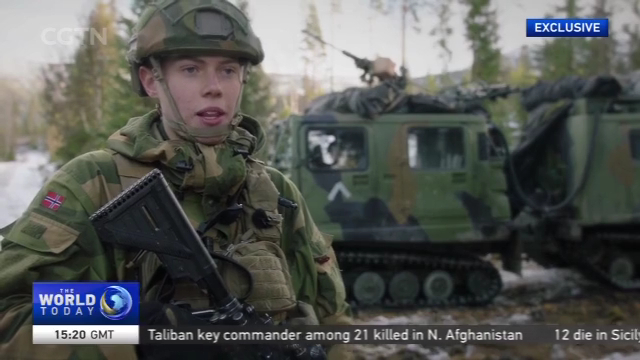
09:37, 05-Nov-2018
'Trident Juncture': CGTN Exclusive: NATO's largest military drills since end of Cold War
Updated
09:09, 08-Nov-2018
03:38

The Trident Juncture is NATO's largest such military exercise since the end of the Cold War. CGTN's Guy Henderson joined the soldiers, and filed this exclusive report from the mountains north of the Norwegian capital of Oslo.
Their job is to find — and engage — an imaginary enemy. In this drill, Norway's second battalion pulls back. But in the mountains east of Tynset these past few days patrols have fought many mock battles against real British troops. Often in the remotest locations.
ALISTAIR SKAJAA NORWAY'S SECOND BATTALION "We loaded onto a helicopter, flew out to a landing zone, and then from there we went to an observation point. And from there, we lay in the post for a few days."
This unit's still above the snowline: temperatures can dip below minus 40 degrees celsius up here. The fire gives them warmth and water. The risk of detection must be balanced against the need to survive. Experienced soldiers, here, say there are no tougher conditions.
SGT. THOMAS SCHLOTVIK NORWAY'S SECOND BATTALION "You get more aware in the Arctic than you would in the desert. It's easy to tell if you're dehydrated in the desert, cause it's hot."
So when orders come through the soldiers strip down as they prepare to move out to avoid overheating. It's not that cold if you breath slowly, if you control your breathing. There's far more to carry in this cold: their packs weigh 50 kilos.
GUY HENDERSON TYNSET, NORWAY "Norway's second battalion have spent a lot of time far from home since 9/11 in places like Afghanistan. But their real expertise is Arctic warfare. So now that NATO is shifting its focus, their skillset is becoming particularly relevant."
They are masters of this freezing wilderness. And north of Norway's borders — such terrain is an increasingly contested space. Back at the command station, resting troops say they're sharing that expertise with NATO allies.
LT. GEORGE DETSIS NORWAY'S SECOND BATTALION "For many other nations participating, it might be challenging, especially how the weather has been the last week: changing from freezing to melting temperature. But that's why it's important to conduct this exercise so that other NATO forces are able to adapt."
Suddenly, they're ordered into action: an enemy patrol's been spotted. By their numbers, they aim to deter - not to fight.
"This is teaching us how to be prepared if anything happens. It's as close to war as you can get."
They move to secure the perimeter. For now at least their tactics have worked. Guy Henderson, CGTN, Tynset, Norway.

SITEMAP
Copyright © 2018 CGTN. Beijing ICP prepared NO.16065310-3
Copyright © 2018 CGTN. Beijing ICP prepared NO.16065310-3